Privileged to be present in people's lives
People
It should have been one of the best days of his life. After 14 years of Jesuit studies and preparation for the priesthood and the day after his ordination on December 9 1972 in<br /> St Ignatius Church, Norwood, Fr Greg O’Kelly was celebrating his first Mass at Holy Name Church, St Peter’s, when tragedy struck.
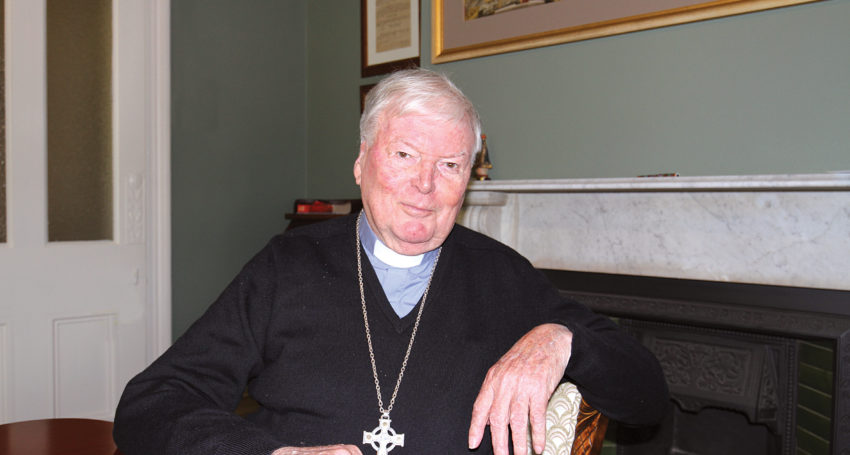
Two Jesuits, seminarian Dr Marc Playoust, who was due to be ordained the following month, and Fr Bill Holland, were killed in a car accident while driving back from Sevenhill to attend
the Mass.
News of the accident reached other Jesuits attending the Mass but was kept from Fr O’Kelly until he had given his final blessings.
“It changed everything,” the now 81-year-old Bishop O’Kelly said ahead of his golden jubilee celebrations in Adelaide and Port Pirie. “My mother had set up a marquee on the front lawn…instead of being festive it was a very stricken gathering.
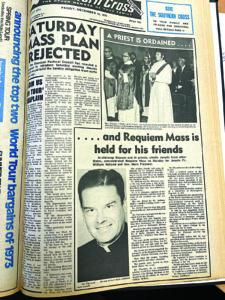
The front page of The Southern Cross in December 1972.
“I spent the first week after my ordination going to requiem Masses. It was sort of a sacrificial element to the priesthood; if this had cost so much, then I’d better be worth it.”
It wasn’t the first time Bishop O’Kelly had experienced the loss of someone close to him. His younger brother David was struck down with encephalitis while his parents were away visiting him in the novitiate in Sydney. Sadly, David died six weeks later.
Advertisement
And after being apart from his parents and sister Jennifer for nine years, he returned to Adelaide and the new Saint Ignatius’ College Athelstone campus for his ‘regency’ (internship), only to have his father die the second night he was home.
As a priest he has shared in the sorrow of others but also moments of great happiness.
“I regard it as an enormous privilege to be close to people in intense moments of their life, the joy of their marriage and the birth of a child, the grief of sudden loss or young death, highly intimate experiences into which the priest is invited, where his presence is appreciated, even though it’s not a matter of words,” he said
“The priest is anointed by his vocation to be between the common place and the sacred, serving the people of God.”
Bishop O’Kelly’s journey to the priesthood began when he was in secondary school at Saint Ignatius’ College in only its second year of operation.
“I was very impressed by the Jesuits, they seemed to like each other’s company. You’d see them crossing the yard and they would joke and talk, there was a strong sense of rapport amongst them,” he explained.
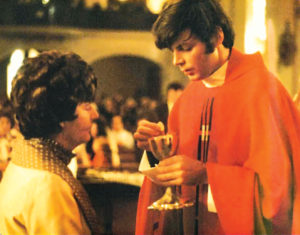
Giving communion to his mother at his ordination Mass.
Like several other young men in his parish who became diocesan priests, he was also influenced by Fr Jim Kelly who he described as “a wonderful, much-loved parish priest”.
But he remained drawn to the Jesuits, partly because of the range of ministries they were involved in, from science and communication to astronomy. “They had a history and an adventure about them,” he said.
Like all Jesuits, he didn’t get a choice and the ministry he was assigned to was teaching.
Advertisement
After his ordination he finished fourth year theology in Melbourne while doing pastoral work with the disadvantaged and was then appointed assistant to the Master of Novices in Sydney.
In 1975 he was transferred back to Saint Ignatius’ College in Adelaide and after two years in the classroom he was made rector. In 1978 the headmaster, Fr Philip Hosking, volunteered to go to the Indian mission and the Provincial appointed the 36-year-old
Fr O’Kelly as headmaster.
“It was interesting because several of the staff had taught me, two of the Jesuits were former headmasters, including one who’d been my headmaster, and suddenly I was theirs. But that’s how they do it in the ‘Js’, you’re a rooster one day and you’re back in the ranks the next.”
Asked what contributed to his obvious leadership qualities, he humbly replied: “Someone once told me I’m a fairly relational character, so I was able to relate to a cross-section of people and to the boys.”
Being involved in the lives of students and their families made being a headmaster a “very priestly role”, he said.
“Jesus came to preach, to teach and to heal and I think those three elements all operate very well in a school.”
After four years he was appointed to Saint Ignatius’ College Riverview, a large, well-established school with almost 400 boarders. It was one of nine Great Public Schools in Sydney.
“That was a bit of a shock because of the size of it and everything, most of the headmasters in those schools were in their 50s, I was just 40, and again in the Jesuit community three had been headmasters before, including at that school,” he said.
In his 11 and a half years at the helm he put a lot of emphasis on identity and mission, that is, “a Catholic school producing men for others”.
On trips back to Adelaide he would sometimes stop and visit the families of students on their properties, on one occasion scaring the student by telling him he was bringing his report card.
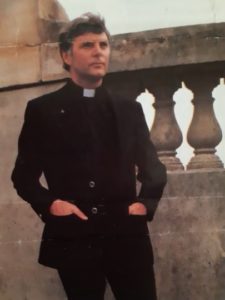
Bishop O’Kelly at St Ignatius’ College Riverview.
During this period Bishop O’Kelly’s reputation as an educator brought him appointments to educational bodies such as the Governing Council of Sydney College of Advanced Education, the Australian College of Education and he became the first Catholic to chair the Association of Heads of Independent Schools of Australia.
In 1994 he was awarded the Order of Australia in the Queen’s Birthday Honours for services to education.
That same year he returned to Adelaide and resumed the role of headmaster at St Ignatius’ College, Adelaide, overseeing the establishment of junior primary years and full co-education and the transfer of Year 7s to senior school. It was exciting times with lots of involvement from staff and parents as the school developed and grew.
The next big “shock” came in 2006 when, at the age of 64, he was contemplating a possible appointment as a rector and some retreat work.
A member of Archdiocesan College of Consultors, he was aware that Archbishop Philip Wilson was looking for an auxiliary bishop but when he received a call one evening from the Apostolic Nuncio, he initially thought it was a young Jesuit he knew called Nuncio. When he realised it was the other ‘Nuncio’ he felt flattered that his opinion was being sought about who would be a good bishop.
“It never occurred to me that I would become a bishop because Jesuits are not made bishops,” he said.
“I told him (the Nuncio) ‘I can’t, we make a vow against it’…but he said ‘yes but you also take another vow’…(implying the Jesuit vow of obedience to the Pope).”
The Nuncio gave him a couple of days to think about it.
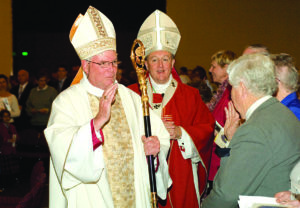
His episcopal ordination at the Adelaide Festival Centre in September 2006. Picture: Ben Searcy
“I remember spending hours in the chapel trying to work it out, and there was this prayer card…Lord give us grace to be totally open to your will to do whatever you call us, no matter the sacrifice. It wasn’t a prayer that pleased me.
“I noted that the prayer had been imposed by Fr Pedro Arrupe, General of the Jesuits. The imprimatur at the bottom of the card was an Indian Jesuit bishop…so I was getting a double whammy.”
After talking to several other Jesuits he came to the conclusion that he couldn’t say no.
While he was the first Australian Jesuit bishop, there were about 120 in other countries, all in the Third World.
Bishop O’Kelly said there was “no rejoicing” amongst the Jesuits: “It’s not like other Orders where they say ‘wacky do, he’s made the First XI’…it was grim.”
After two years as Auxiliary Bishop he was driving back to Adelaide from the Chrism Mass in Port Pirie when the Apostolic Nuncio rang to tell him he was appointed Bishop of Port Pirie. His response: “I might as well do a U-turn.”
Once again he was surprised by the news, but he was pleased to be able to “respond to the need” after several years of there not being a bishop in the rural diocese. There was also a sense of “coming home” as his parents were from the Mid North and there was a Jesuit connection with much of the diocese set up by the Jesuits from Sevenhill.
He described his 11 and a half years in Pirie as “a fruitful life, very busy, non-stop” as he served small communities over big distances. He admired the “great spirit” of the locals as they faced the challenge of a vast diocese with limited resources.
A highlight included leading teachers and parishioners on five pilgrimages, one of which was the canonisation of Mary MacKillop in Rome, and he speaks with great fondness of, and respect for, the five Filipino priests whom he invited into the diocese, all of whom are now Australian citizens.
It was that same sense of responding to a need that motivated him as he took on the role of Apostolic Administrator after the resignation of Archbishop Wilson in 2018.
Travelling thousands of kilometres between Port Pirie and Adelaide (accompanied by his beloved kelpie Jezabel), he steered the Archdiocese through one of the most difficult periods of its history. His ‘relational’ leadership, which included setting up a ‘kitchen cabinet’ of key people to advise him, not to mention his keen sense of humour, were invaluable.
Bishop O’Kelly concedes that the clerical abuse crisis has eroded the standing of the priest.
“It’s very difficult when a scandal breaks open, and you walk out on the altar, you wonder what may be going on in the minds of the people,” he said.
But he insists it’s been “50 very rich years” of priesthood.
“I have been privileged to have many marvellous people come into my life through the schools, the people and clergy of the diocese, from the Jesuits and others. I have known great affection from the people, which has humbled me.”



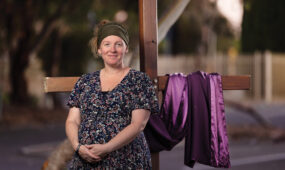
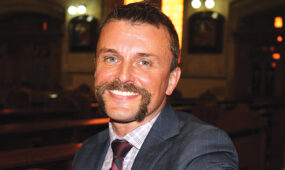
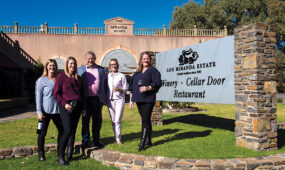
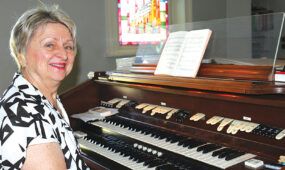

Comments
Show comments Hide comments